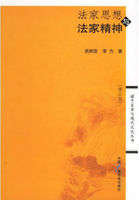Soc. But that was not acknowledged by Lysias in his speech, nor by you in that other speech which you by a charm drew from my lips. For if love be, as he surely is, a divinity, he cannot be evil. Yet this was the error of both the speeches. There was also a simplicity about them which was refreshing; having no truth or honesty in them, nevertheless they pretended to be something, hoping to succeed in deceiving the manikins of earth and gain celebrity among them. Wherefore I must have a purgation. And I bethink me of an ancientpurgation of mythological error which was devised, not by Homer, forhe never had the wit to discover why he was blind, but by Stesichorus, who was a philosopher and knew the reason why; and therefore, when he lost his eyes, for that was the penalty which was inflicted upon him for reviling the lovely Helen, he at once purged himself. And the purgation was a recantation, which began thus,-False is that word of mine-the truth is that thou didst not embark in ships, nor ever go to the walls of Troy;and when he had completed his poem, which is called ”the recantation,” immediately his sight returned to him. Now I will be wiser than either Stesichorus or Homer, in that I am going to make my recantation for reviling love before I suffer; and this I will attempt, not as before, veiled and ashamed, but with forehead bold and bare.
Phaedr. Nothing could be more agreeable to me than to hear you say so.
Soc. Only think, my good Phaedrus, what an utter want of delicacy was shown in the two discourses; I mean, in my own and in that which you recited out of the book. Would not any one who was himself of a noble and gentle nature, and who loved or ever had loved a nature like his own, when we tell of the petty causes of lovers" jealousies, and of their exceeding animosities, and of the injuries which they do totheir beloved, have imagined that our ideas of love were taken fromsome haunt of sailors to which good manners were unknown-he wouldcertainly never have admitted the justice of our censure?
Phaedr. I dare say not, Socrates.
Soc. Therefore, because I blush at the thought of this person, and also because I am afraid of Love himself, I desire to wash the brine out of my ears with water from the spring; and I would counsel Lysias not to delay, but to write another discourse, which shall prove that ceteris paribus the lover ought to be accepted rather than the non-lover.
Phaedr. Be assured that he shall. You shall speak the praises of the lover, and Lysias shall be compelled by me to write another discourse on the same theme.
Soc. You will be true to your nature in that, and therefore I believe you.
Phaedr. Speak, and fear not.
Soc. But where is the fair youth whom I was addressing before, and who ought to listen now; lest, if he hear me not, he should accept a non-lover before he knows what he is doing?
Phaedr. He is close at hand, and always at your service.
Soc. Know then, fair youth, that the former discourse was the word of Phaedrus, the son of Vain Man, who dwells in the city of Myrrhina (Myrrhinusius). And this which I am about to utter is therecantation of Stesichorus the son of Godly Man (Euphemus), whocomes from the town of Desire (Himera), and is to the following effect: ”I told a lie when I said” that the beloved ought to accept the non-lover when he might have the lover, because the one is sane, and the other mad. It might be so if madness were simply an evil; but there is also a madness which is a divine gift, and the source of the chiefest blessings granted to men. For prophecy is a madness, and the prophetess at Delphi and the priestesses at Dodona when out of their senses have conferred great benefits on Hellas, both in public and private life, but when in their senses few or none. And I might also tell you how the Sibyl and other inspired persons have given to many an one many an intimation of the future which has saved them from falling. But it would be tedious to speak of what every one knows.
There will be more reason in appealing to the ancient inventors of names, who would never have connected prophecy (mantike) which foretells the future and is the noblest of arts, with madness (manike), or called them both by the same name, if they had deemed madness to be a disgrace or dishonour;-they must have thought that there was an inspired madness which was a noble thing; for the two words, mantike and manike, are really the same, and the letter t is only a modern and tasteless insertion. And this is confirmed by the name which was given by them to the rational investigation of futurity, whether made by the help of birds or of other signs-this,for as much as it is an art which supplies from the reasoningfaculty mind (nous) and information (istoria) to human thought (oiesis) they originally termed oionoistike, but the word has been lately altered and made sonorous by the modern introduction of the letter Omega (oionoistike and oionistike), and in proportion prophecy (mantike) is more perfect and august than augury, both in name and fact, in the same proportion, as the ancients testify, is madness superior to a sane mind (sophrosune) for the one is only of human, but the other of divine origin. Again, where plagues and mightiest woes have bred in certain families, owing to some ancient blood-guiltiness, there madness has entered with holy prayers and rites, and by inspired utterances found a way of deliverance for those who are in need; and he who has part in this gift, and is truly possessed and duly out of his mind, is by the use of purifications and mysteries made whole and except from evil, future as well as present, and has a release from the calamity which was afflicting him. The third kind is the madness of those who are possessed by the Muses; which taking hold of a delicate and virgin soul, and there inspiring frenzy, awakens lyrical and all other numbers; with these adorning the myriad actions of ancient heroes for the instruction of posterity. But he who, having no touch of the Muses" madness in his soul, comes to the door and thinks that he will get into the temple by the help of art-he, I say, and his poetry are not admitted; the sane man disappears and is nowhere when he enters into rivalry with the madman.















